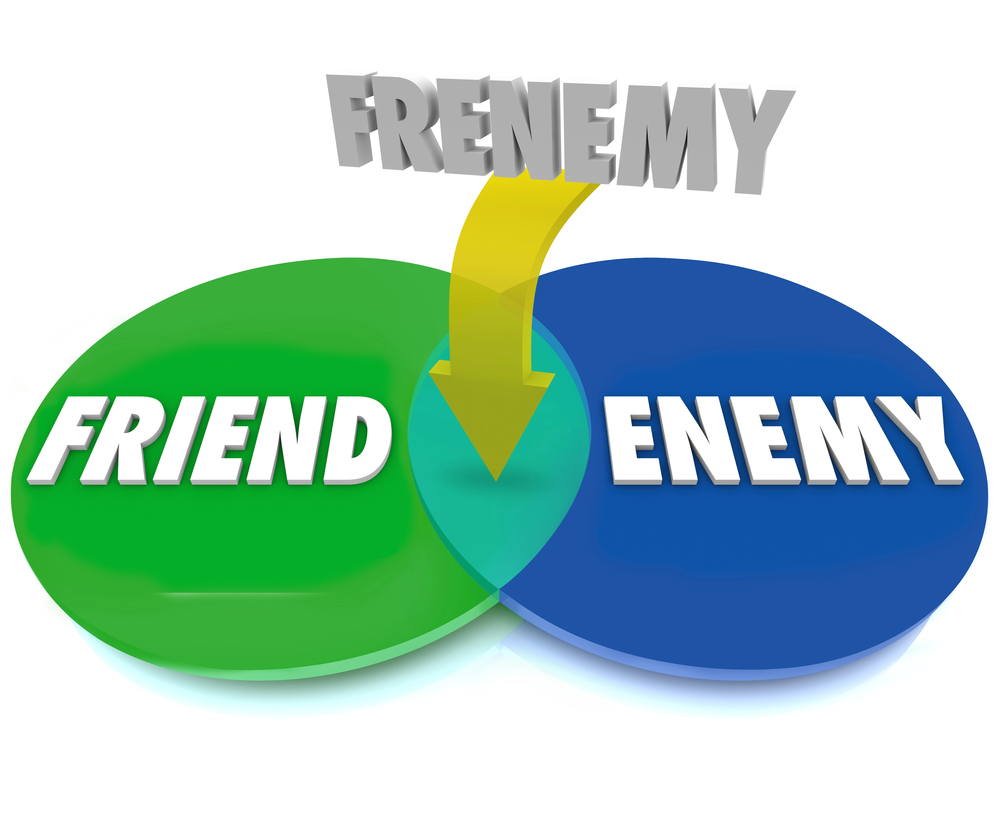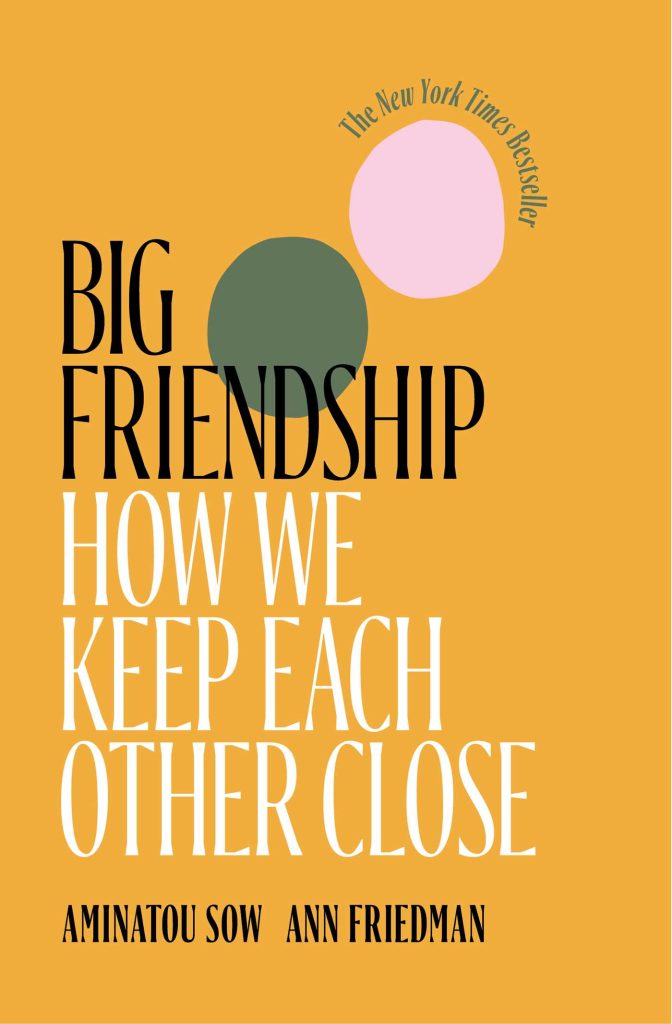 A “frenemy” (a blend of “friend” and “enemy”) refers to someone who pretends to be a friend but actually harbours feelings of resentment, jealousy, or rivalry toward you. On the surface, frenemies might appear supportive and friendly, but their actions or words can subtly or overtly undermine, sabotage, or criticize. This kind of relationship can be particularly complex and confusing because it combines elements of friendship, such as mutual activities and shared information, with elements of antagonism and competitiveness. When this happens at work, where one’s livelihood is at stake, it can be especially difficult.
A “frenemy” (a blend of “friend” and “enemy”) refers to someone who pretends to be a friend but actually harbours feelings of resentment, jealousy, or rivalry toward you. On the surface, frenemies might appear supportive and friendly, but their actions or words can subtly or overtly undermine, sabotage, or criticize. This kind of relationship can be particularly complex and confusing because it combines elements of friendship, such as mutual activities and shared information, with elements of antagonism and competitiveness. When this happens at work, where one’s livelihood is at stake, it can be especially difficult.
Reflecting on my own experiences plus insights gained from the book Big Friendship, written by long-term friends and (former) podcast co-hosts Aminatou Sow and Ann Friedman; I’ve come to appreciate more subtleties of friendship, both personally and professionally. The book emphasizes the significance of nurturing meaningful connections and navigating the intricacies of adult friendships.
When faced with such scenarios within our professional networks, it puts pressure on those relationships, complicating our interactions and creating tension in the workplace.
Navigating Friendship in a Busy World
Big Friendship: How We Keep Each Other Close (also mentioned above) is a memoir and exploration of the profound bond between authors Aminatou Sow and Ann Friedman. Drawing from their own experiences, Sow and  Friedman delve into the complexities of adult friendship, including forgiveness, navigating racial dynamics and the challenges of maintaining deep connections despite living in a busy world (e.g., career changes, moving to a new city, marriages/intimate relationships, children, etc.). Their book highlights the unique role that close friends play in our lives – personally and professionally.
Friedman delve into the complexities of adult friendship, including forgiveness, navigating racial dynamics and the challenges of maintaining deep connections despite living in a busy world (e.g., career changes, moving to a new city, marriages/intimate relationships, children, etc.). Their book highlights the unique role that close friends play in our lives – personally and professionally.
Allies or Adversaries? The Complexities of Frenemy Dynamics
Colleagues can seamlessly transition between camaraderie and healthy/friendly competition, blurring the lines between allyship and rivalry. In the context of workplace relationships, this nuanced interplay sometimes gives rise to the phenomenon of frenemies, where colleagues can seamlessly shift from being buddies to fierce competitors.
Even among our closest colleagues, there can be moments when tensions rise and the line between friend and foe blurs. In the context of workplace relationships, frenemies may compete for promotions, gossip about each other, or engage in passive-aggressive behaviour while maintaining a facade of friendliness.
In a competitive work environment where recognition, advancement, and other markers of success are coveted, the presence of frenemies can create a complex breeding ground for workplace jealousy. The conflicting feelings associated with friendship and competition can sometimes stoke feelings of inadequacy and resentment, leading individuals to harbour envy toward their colleagues’ achievements or their perceived advantages.
 Whether this manifests as subtle, silent glances of disapproval or passive-aggressive remarks disguised as compliments, the undercurrent of envy can poison the workplace atmosphere and strain professional relationships. Recognizing and addressing these feelings of jealousy is essential for fostering a healthy and supportive work environment where mutual respect and collaboration can thrive despite the challenges posed by frenemy dynamics. When one throws issues and biases related to race, religion, sexual orientation, sexual identity, and other personal characteristics into the mix, these challenges can really escalate.
Whether this manifests as subtle, silent glances of disapproval or passive-aggressive remarks disguised as compliments, the undercurrent of envy can poison the workplace atmosphere and strain professional relationships. Recognizing and addressing these feelings of jealousy is essential for fostering a healthy and supportive work environment where mutual respect and collaboration can thrive despite the challenges posed by frenemy dynamics. When one throws issues and biases related to race, religion, sexual orientation, sexual identity, and other personal characteristics into the mix, these challenges can really escalate.
Sometimes, things get off track because of misunderstandings or differences that can be reconciled or at least mitigated through mutual effort and communication. Attempting to understand your frenemy better might help reduce tension. If there’s a specific incident that has caused tension, discussing it openly (but respectfully) can sometimes clear the air. But, let’s face it, this is often easier said than done.
Social Media Paradox: Balancing Respect and Professionalism
The pandemic reshaped and narrowed our social interactions, particularly with in-person gatherings restricted. Many of us turned to social media to stay connected with our friends. During this time, social media provided a window into our friends’ lives, allowing us to infer their values and interests based on their posts. In some ways, this digital connection helped maintain a sense of closeness, but it also unveiled unexpected challenges. The parallels between personal friendships and professional relationships are striking. Just as unexpected social media posts can strain personal connections, encountering conflicting values or interests among colleagues at work can strain professional relationships.
Thus, navigating workplace friendships amid conflicting values in the backdrop of a global pandemic has become an increasingly challenging task. The divisions that emerged during this tumultuous time have left a lasting impact on relationships—severing ties and straining connections once thought to be solid.
Many people have found themselves caught in the crossfire, grappling with the challenge of remaining respectful and professional while navigating conflicting viewpoints. The need to uphold civility in the workplace becomes even more crucial as tensions run high and emotions flare. Yet, maintaining decorum in the face of passionate values-based disagreements can feel like an uphill battle.
How Leadership Sets the Tone for Frenemy Dynamics
As an HR Consultant and Career Coach, I often emphasize the crucial role of leadership and how it sets the tone for workplace culture. This concept takes on added significance in the realm of frenemies at work.
The dynamic between colleagues who oscillate between friendship and dysfunctional competition can influence the overall atmosphere within the workplace. Instances of incivility or discord between frenemies can perpetuate a cycle of negativity, leading to decreased productivity and profitability.
 Moreover, following the divisiveness and charged political culture following the global pandemic and racial/social justice reckoning, where some tensions are still heightened and emotions still run high, the importance of maintaining civility and integrity becomes even more pronounced. Failing to speak up or take actions aligned with our values not only impacts immediate interactions but can also leave a lasting impression that may be difficult to overcome.
Moreover, following the divisiveness and charged political culture following the global pandemic and racial/social justice reckoning, where some tensions are still heightened and emotions still run high, the importance of maintaining civility and integrity becomes even more pronounced. Failing to speak up or take actions aligned with our values not only impacts immediate interactions but can also leave a lasting impression that may be difficult to overcome.
Recognizing and navigating frenemy relationships can be challenging, as we must balance professionalism, focus on our work, and maintain our integrity. Recognizing signs of frenemy behaviour, setting clear boundaries, and prioritizing self-care are essential strategies for managing these complex dynamics in personal and professional settings.
Did this article spark any career-related questions, plans or concerns?
Reach out today for a free and confidential initial consultation by phone, email, or via direct message on Twitter/X, Facebook or LinkedIn.
P.S. If you haven’t yet done so, stay in the loop by subscribing to my bi-monthly newsletter. Click here. I promise not to spam, and your email address will always stay private.
If you enjoyed this topic or are interested in ongoing professional and leadership development, you’ll also enjoy reading or listening to How to Be Resilient in Your Career: Facing up to Barriers at Work, my book that was published in 2023 by Routledge. It’s available in print, as an eBook, and on Audible.
More than career coaching, it’s career psychology®.
I/O Advisory Services Inc. – Building Resilient Careers and Organizations TM.



